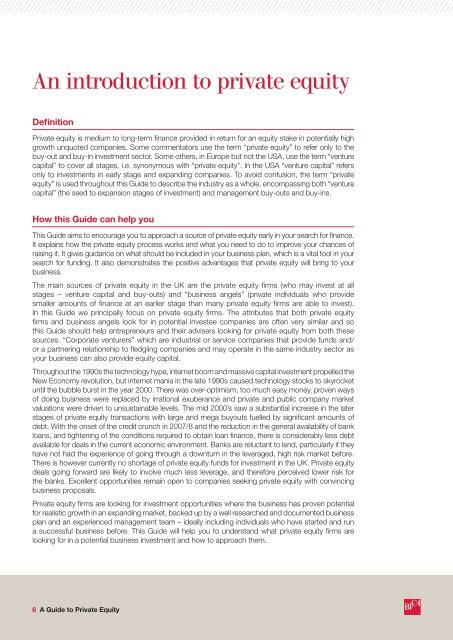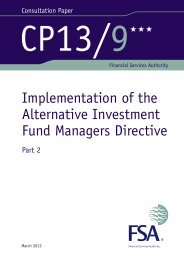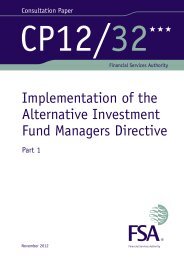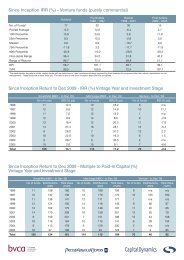A Guide to Private Equity - BVCA admin
A Guide to Private Equity - BVCA admin
A Guide to Private Equity - BVCA admin
Create successful ePaper yourself
Turn your PDF publications into a flip-book with our unique Google optimized e-Paper software.
An introduction <strong>to</strong> private equity<br />
Definition<br />
<strong>Private</strong> equity is medium <strong>to</strong> long-term finance provided in return for an equity stake in potentially high<br />
growth unquoted companies. Some commenta<strong>to</strong>rs use the term “private equity” <strong>to</strong> refer only <strong>to</strong> the<br />
buy-out and buy-in investment sec<strong>to</strong>r. Some others, in Europe but not the USA, use the term “venture<br />
capital” <strong>to</strong> cover all stages, i.e. synonymous with “private equity”. In the USA “venture capital” refers<br />
only <strong>to</strong> investments in early stage and expanding companies. To avoid confusion, the term “private<br />
equity” is used throughout this <strong>Guide</strong> <strong>to</strong> describe the industry as a whole, encompassing both “venture<br />
capital” (the seed <strong>to</strong> expansion stages of investment) and management buy-outs and buy-ins.<br />
How this <strong>Guide</strong> can help you<br />
This <strong>Guide</strong> aims <strong>to</strong> encourage you <strong>to</strong> approach a source of private equity early in your search for finance.<br />
It explains how the private equity process works and what you need <strong>to</strong> do <strong>to</strong> improve your chances of<br />
raising it. It gives guidance on what should be included in your business plan, which is a vital <strong>to</strong>ol in your<br />
search for funding. It also demonstrates the positive advantages that private equity will bring <strong>to</strong> your<br />
business.<br />
The main sources of private equity in the UK are the private equity firms (who may invest at all<br />
stages – venture capital and buy-outs) and “business angels” (private individuals who provide<br />
smaller amounts of finance at an earlier stage than many private equity firms are able <strong>to</strong> invest).<br />
In this <strong>Guide</strong> we principally focus on private equity firms. The attributes that both private equity<br />
firms and business angels look for in potential investee companies are often very similar and so<br />
this <strong>Guide</strong> should help entrepreneurs and their advisers looking for private equity from both these<br />
sources. “Corporate venturers” which are industrial or service companies that provide funds and/<br />
or a partnering relationship <strong>to</strong> fledgling companies and may operate in the same industry sec<strong>to</strong>r as<br />
your business can also provide equity capital.<br />
Throughout the 1990s the technology hype, internet boom and massive capital investment propelled the<br />
New Economy revolution, but internet mania in the late 1990s caused technology s<strong>to</strong>cks <strong>to</strong> skyrocket<br />
until the bubble burst in the year 2000. There was over-optimism, <strong>to</strong>o much easy money, proven ways<br />
of doing business were replaced by irrational exuberance and private and public company market<br />
valuations were driven <strong>to</strong> unsustainable levels. The mid 2000’s saw a substantial increase in the later<br />
stages of private equity transactions with large and mega buyouts fuelled by significant amounts of<br />
debt. With the onset of the credit crunch in 2007/8 and the reduction in the general availability of bank<br />
loans, and tightening of the conditions required <strong>to</strong> obtain loan finance, there is considerably less debt<br />
available for deals in the current economic environment. Banks are reluctant <strong>to</strong> lend, particularly if they<br />
have not had the experience of going through a downturn in the leveraged, high risk market before.<br />
There is however currently no shortage of private equity funds for investment in the UK. <strong>Private</strong> equity<br />
deals going forward are likely <strong>to</strong> involve much less leverage, and therefore perceived lower risk for<br />
the banks. Excellent opportunities remain open <strong>to</strong> companies seeking private equity with convincing<br />
business proposals.<br />
<strong>Private</strong> equity firms are looking for investment opportunities where the business has proven potential<br />
for realistic growth in an expanding market, backed up by a well researched and documented business<br />
plan and an experienced management team – ideally including individuals who have started and run<br />
a successful business before. This <strong>Guide</strong> will help you <strong>to</strong> understand what private equity firms are<br />
looking for in a potential business investment and how <strong>to</strong> approach them.<br />
6 A <strong>Guide</strong> <strong>to</strong> <strong>Private</strong> <strong>Equity</strong>
















